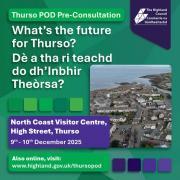Highland Council To Launch E-vouchers For Free School Meals
27th March 2020
Highland Council will be providing e-vouchers to families to support access to free school meals from week commencing 30 March 2020.
This innovative and easy-to-use service will ensure over 4,000 school children will continue to receive support for school meals while schools are closed. For the majority of pupils, this will be delivered digitally through e-vouchers for food in local supermarkets.
Enabling choice will provide flexibility and also help to reduce waste, as food can be purchased according to need or preference in the household. Some restrictions do apply as the e-vouchers cannot be used to purchase age restricted products such as tobacco, alcohol, lottery tickets and fuel.
The impact of Coronavirus has caused many vulnerable families additional hardship and this process will ensure that the most vulnerable children can get food.
Highland Council continues to investigate other ways of providing food across the Highlands for vulnerable groups within the rapidly changing environment. This includes working closely with High Life Highland, Eden Court and our many partners including the Third Sector. Further information will be provided in due course.
Cllr John Finlayson, Chair of the Education Committee, said: "The provision of school meals is a priority service that we are committed to delivering including during when schools are closed in the current times. I applaud the Highland Council staff who are working hard to implement this service as quickly as possible and for e-vouchers to be issued next week".
A helpline number has been set up for anyone who is struggling and needing urgent help during this crisis. The single line number - 0300 303 1362 - will connect callers to relevant Council specialist teams and will operate Monday to Friday from 8am to 6pm. All calls are free.
Related Businesses
Related Articles
Exciting Career Opportunities With The Highland Council Now Open For Applications
# 10 December 2025 Career opportunities with The Highland Council The Highland Council is looking to fill a variety of posts relating to civil engineering and flood risk management based in locations across the area. Included are opportunities specifically for civil engineering graduates and technicians, providing the ideal job with career progression for anyone recently qualified and ready for a varied and interesting role.
What the NC500 Research Projects Are Designed to Do - and Why They Matter for the Highlands
As the North Coast 500 approaches its tenth anniversary, it has become one of Scotland's most well-known tourism success stories. The 516-mile loop around the far north of the Highlands has been celebrated internationally, marketed as a world-class road trip, and credited with transforming visitor numbers in some of Scotland’s most remote areas.Help Shape the Future of Thurso
The Highland Council is inviting people that live, work, or study in Thurso, to come along to the public consultation events to have their say. This is an opportunity to help shape the future of Thurso, to gather views and ideas.
Are Scottish Councils Quietly Reversing Outsourcing? A Look at Insourcing, Cuts and the Highland IT Shift
A notable article in the Guardian on 6 December 2025 noted the high sums being paid by London councils outsourcing services to private firms. The article starts with the reduction in council funding by UK government since 2010.Council welcomes Visitor Levy flexibility plan
The Highland Council welcomes moves by the Scottish Government to introduce greater flexibility on how it could design a Visitor Levy Scheme for consultation. The Visitor Levy (Scotland) Act 2024 currently provides local authorities with discretionary powers to implement percentage-based levies following statutory consultation.Highland Council is reaching out for views to shape its next 26/27 budget.
As it looks to set out its forthcoming priorities, the council is seeking involvement from members of the public, including businesses, community groups, parents, and young people. All their opinions are going to be crucial in deciding how Highland Council will take on its budget challenge for 2026-2027.Have your say in Thurso's future £100million investment by attending public consultation events
Thurso is to benefit from £100m investment in education and community facilities and are rolling out the first phase of public consultations on 9 and 10 December 2025. The Highland Council is inviting people that live, work, or study in Thurso, to come along to the public consultation events to have their say; this is an opportunity to help shape the future of Thurso, to gather views and ideas.Finding new owners for empty homes - Scheme launched to help return more empty homes to active use
A new online portal has been launched to bring empty homeowners together with prospective buyers or developers with the aim of facilitating more properties to be used as homes again. Covering the whole of Scotland, this builds on the success of local pilots, referred to as "matchmaker schemes".Consideration for short term let control area in Skye and Raasay
Steps towards introducing a short term let control area have been considered by Highland Council's Isle of Skye and Raasay area committee. On Monday (1 December 2025) the committee heard evidence to justify the grounds for the introduction of a Short Term Let Control Area covering all or part of Skye and Raasay.Workforce North event spotlights Highland economy
EMPLOYERS and educators from across the Highlands have gathered to hear how a new initiative is aiming to transform the region's economy. Workforce North - A Call to Action brought together business leaders and teachers from primary and secondary schools from across the Highland Council area with a wide range of partners geared towards education, learning and skills development at Strathpeffer Pavillion.
